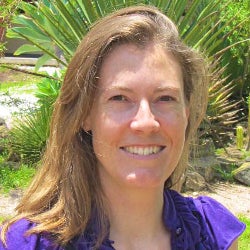Harriot College announces 2020 Dean’s Early Career Award recipient
East Carolina University’s Thomas Harriot College of Arts and Sciences has named Dr. Beth Bee, assistant professor of geography, planning and environment, recipient of the 2020 Dean’s Early Career Award.
“It is an enormous honor and great privilege to be recognized,” Bee said.
Established in 2015 through the generosity of Harriot College’s Dean’s Advancement Council, the award recognizes and rewards exceptional performance by tenure-track assistant professors. It represents the college’s breadth of faculty excellence in the humanities, social sciences, natural sciences and mathematics.
“Harriot College is the heartbeat of the university and a core element of innovation and scholarly excellence at ECU,” Bee said. “I enjoy working amongst such a talented group of scientists, historians and humanists and contributing not only to our collective ingenuity but also our broader mission to educate and prepare our students to be global citizens and change makers.”

Dr. Beth Bee, assistant professor of geography, planning and environment, has been named the recipient of the 2020 Dean’s Early Career Award. (Contributed photo)
Bee came to ECU in January 2014 and teaches courses in people, places and environments; gender, environment and development; geography of environmental resources; social justice and sustainability; and geographies of global climate change.
In addition to her teaching, Bee has served as the geography department’s writing liaison since 2014. She is an affiliate faculty and an executive committee member of both Harriot College’s international studies and gender studies programs, has served on ECU’s faculty welfare committee, and this past year was an ex-officio member of the teaching grants committee.
In her teaching, Bee likes to challenge students’ views.
“I really enjoy exposing students to new ways of thinking about their own environments and challenging them to think about the ways that gender, race, class and other social differences infuse everyday problems and solutions to environmental issues,” Bee said.
Bee appreciates how ECU also provides her with the ability to focus on her research interests.
“I relish the opportunity I have to interact with rural community members in Mexico and Nicaragua and to share their experiences and knowledge about environmental and agricultural change with others,” Bee said. “Their experiences, and particularly the ways that historical and structural marginalization shape these experiences, are often under acknowledged and invisible, yet they provide important insights into the need for more socially just environmental and agricultural practices.”
In her free time, Bee enjoys recreational and outdoor activities, including swimming, cycling, paddle boarding, riding horses and playing with her dogs.
-by Lacey L. Gray, University Communications